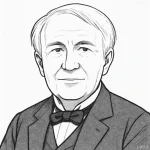“When I was younger I could remember anything, whether it happened or not.”

- November 30, 1835 – April 21, 1910
- American
- Author, humorist, and lecturer
table of contents
Quote
“When I was younger I could remember anything, whether it happened or not.”
Explanation
Mark Twain’s quote humorously reflects on the nature of memory and the fickleness of youth. He suggests that, in his younger days, his memory was so vivid or perhaps even so wildly imaginative that he could remember things—whether they actually happened or not. This self-deprecating humor highlights the unreliable or romanticized nature of memory in youth, where imagination and recollection sometimes blur together, making it difficult to discern what is real from what is simply remembered or embellished. The humor comes from the fact that Twain implies a carefree, almost fantastical attitude toward memory, where the truth is secondary to the experience.
Twain’s words also reflect his satirical style, poking fun at how our memories, particularly in youth, can be inconsistent and subjective, often shaped by our emotions or desires rather than facts. This tendency to embellish or reinterpret events is part of being human, and Twain humorously suggests that he was especially prone to it in his younger years, when his mind might have been more flexible or unbound by the constraints of reality.
In modern contexts, this quote is relatable when discussing the nature of nostalgia and personal history. As we grow older, we often look back on past events with a sense of fondness or embellishment, and our memories may be influenced by emotional attachment or even myth-making. Twain’s words remind us to recognize that memory is not always an accurate reflection of the past, but rather a personal interpretation, shaped by time, emotion, and imagination.
Would you like to share your impressions or related stories about this quote in the comments section?




